Faculty Publications – Post Archives
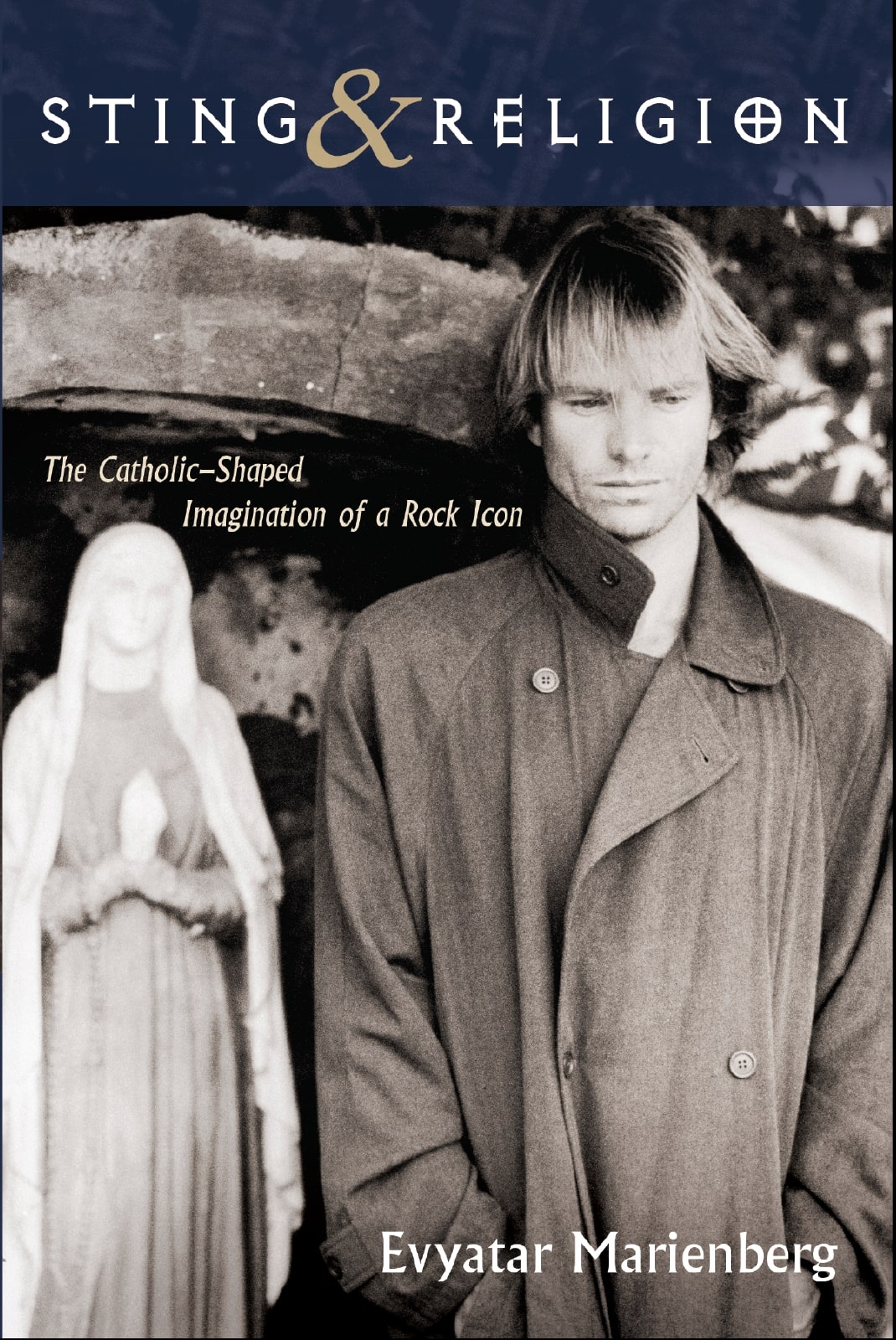 Professor Evyatar Marienberg has just published his new book, Sting and Religion: The Catholic-Shaped Imagination of a Rock Icon (Cascade Press / Wipf and Stock, 2021). From the publisher’s website description of the book:
Professor Evyatar Marienberg has just published his new book, Sting and Religion: The Catholic-Shaped Imagination of a Rock Icon (Cascade Press / Wipf and Stock, 2021). From the publisher’s website description of the book:
On the back cover of one of his most groundbreaking solo albums, . . . Nothing like the Sun of 1987, Sting (Gordon Matthew Sumner, b. 1951 in Wallsend, UK) somberly stands close to a statue of Mary, the mother of Jesus. The album was released a few months after his own mother, Audrey, died. The picture was taken on the island of Montserrat, where he was recording the album, apparently on the day of her death. “I said goodbye to my mother, as I had a recording date in Montserrat, and she died a week later.” When asked by the author if his mother was particularly connected to Mary, and if this was why he chose this image, he replied “No, but I did.” This evocative photograph and Sting’s quick answer encapsulate the two pillars of this book: a microhistory of a specific British Catholic parish in the 1950s-60s, and the impact that growing up there had on Sting’s artistic output. And beyond that, this book opens a window onto the influence of Catholic education and imagination on millions of less famous people who had similar upbringings.
A discount voucher for purchasing the book, as well as much more information on the work, can be found on the book’s website: http://www.stingandreligion.com
For previous posts on Prof. Marienberg’s work on this topic, see here and here.
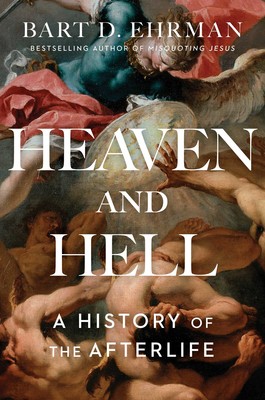 Professor Bart Ehrman was on NPR’s Fresh Air with Terry Gross last week, where he discussed his brand new book titled Heaven and Hell: A History of the Afterlife (Simon & Schuster, 2020). In this book, Prof. Ehrman takes on the questions: where did the ideas of heaven and hell come from, and why do they endure? He recounts the long history of the afterlife and helps us reflect on where our ideas of it come from.
Professor Bart Ehrman was on NPR’s Fresh Air with Terry Gross last week, where he discussed his brand new book titled Heaven and Hell: A History of the Afterlife (Simon & Schuster, 2020). In this book, Prof. Ehrman takes on the questions: where did the ideas of heaven and hell come from, and why do they endure? He recounts the long history of the afterlife and helps us reflect on where our ideas of it come from.
Listen to the interview in the player below, or on the NPR website.
Posted in Faculty Publications on April 6, 2020
 Professor Evyatar Marienberg published a guest blog post on the University of Toronto Press website called “When a rock star whose picture you had on your wall as a teenager becomes your topic of academic study as an adult.” He describes his project on the religious themes in Sting’s music and life. Prof. Marienberg also highlights a recent article in the Journal of Religion and Popular Culture, “O My God: Religion in Sting’s Early Lyrics.”
Professor Evyatar Marienberg published a guest blog post on the University of Toronto Press website called “When a rock star whose picture you had on your wall as a teenager becomes your topic of academic study as an adult.” He describes his project on the religious themes in Sting’s music and life. Prof. Marienberg also highlights a recent article in the Journal of Religion and Popular Culture, “O My God: Religion in Sting’s Early Lyrics.”
From the blog post:
“We are all influenced, in different ways, by popular culture. Our popular culture is influenced, in different ways, by religion. What occurs when those among us who are not only influenced by, but actually contribute much to, the popular culture around us, have religion influence them as well? This result is of particular interest for me, and for many of those writing for this journal.
“Having contemporary Catholicism as one of my main fields of interest, I quickly realized that Sting represents the type of Catholics I am most interested in: those who were born about a decade before the Second Council of the Vatican (a meeting of the world’s Catholic bishops from 1962 to 1965), which brought huge changes to Catholicism.”
Posted in Faculty News, Faculty Publications on January 31, 2020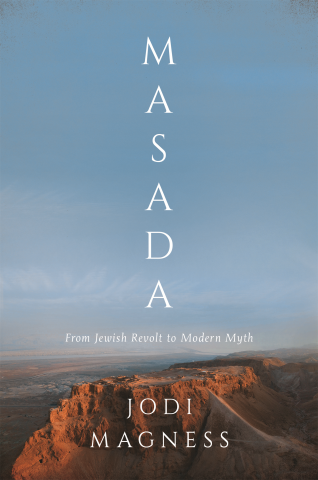 Professor Jodi Magness’s recent book, Masada: From Jewish Revolt to Modern Myth, was selected as a finalist for the 2019 National Jewish Book Award in History (the Gerrard and Ella Berman Memorial Award). The National Jewish Book Awards were established by the Jewish Book Council in 1950 in order to recognize outstanding works of Jewish literature.
Professor Jodi Magness’s recent book, Masada: From Jewish Revolt to Modern Myth, was selected as a finalist for the 2019 National Jewish Book Award in History (the Gerrard and Ella Berman Memorial Award). The National Jewish Book Awards were established by the Jewish Book Council in 1950 in order to recognize outstanding works of Jewish literature.
From a review of the book by Gila Wertheimer:
“In her new book, Masada: From Jewish Revolt to Modern Myth, Magness re-examines the story of Masada, setting it in its historical context during the period of the Second Temple. As part of this she includes the fascinating stories of 19th century explorers who travelled to the area, many searching for biblical sites, but on their return provided valuable information about the inhospitable region. She addresses questions some scholars have today about the accuracy of the story of mass suicide, taken from the multi-volume The Jewish War by the Jewish historian Flavius Josephus… Magness has managed the difficult feat of writing for both the scholar and the interested non-specialist reader. There is plenty of archaeological detail and description, which comes with the history of the area as well as topics such as how the Jews got to Masada, how they survived, and how the desert fortress became part of the foundational story of the modern state of Israel.”
Congratulations, Jodi!
Posted in Faculty News, Faculty Publications on January 21, 2020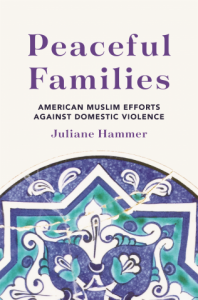 The latest book by Juliane Hammer, Associate Professor in the Department of Religious Studies, takes an in-depth look at how American Muslims address domestic violence within their communities. From the Princeton University Press website:
The latest book by Juliane Hammer, Associate Professor in the Department of Religious Studies, takes an in-depth look at how American Muslims address domestic violence within their communities. From the Princeton University Press website:
“Looking at connections among ethical practices, gender norms, and religious interpretation, Hammer demonstrates how Muslim advocates mobilize a rich religious tradition in community efforts against domestic violence, and identify religion and culture as resources or roadblocks to prevent harm and to restore family peace.”
“Drawing on her interviews with Muslim advocates, service providers, and religious leaders, Hammer paints a vivid picture of the challenges such advocacy work encounters. The insecurities of American Muslim communities facing intolerance and Islamophobia lead to additional challenges in acknowledging and confronting problems of spousal abuse, and Hammer reveals how Muslim anti–domestic violence workers combine the methods of the mainstream secular anti–domestic violence movement with Muslim perspectives and interpretations.”
Posted in Faculty Publications on September 5, 2019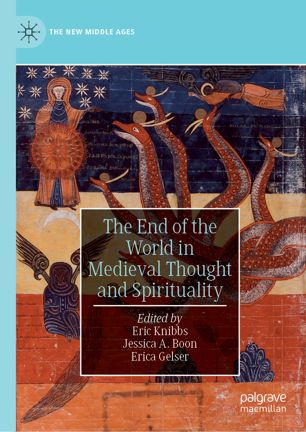 Associate Professor, Jessica Boon, along with Eric Knibbs and Erica Gelser, have co-edited a collection of essays titled The End of the World in Medieval Thought and Spirituality (Springer, 2019) in honor of the retirement of E. Ann Matter, now Professor Emerita at the University of Pennsylvania. From the Springer website:
Associate Professor, Jessica Boon, along with Eric Knibbs and Erica Gelser, have co-edited a collection of essays titled The End of the World in Medieval Thought and Spirituality (Springer, 2019) in honor of the retirement of E. Ann Matter, now Professor Emerita at the University of Pennsylvania. From the Springer website:
“This essay collection studies the Apocalypse and the end of the world, as these themes occupied the minds of biblical scholars, theologians, and ordinary people in Antiquity, the Middle Ages, and Early Modernity. It opens with an innovative series of studies on “Gendering the Apocalypse,” devoted to the texts and contexts of the apocalyptic through the lens of gender. A second section of essays studies the more traditional problem of “Apocalyptic Theory and Exegesis,” with a focus on authors such as Augustine of Hippo and Joachim of Fiore. A final series of essays extends the thematic scope to “The Eschaton in Political, Liturgical, and Literary Contexts.” In these essays, scholars of history, theology, and literature create a dialogue that considers how fear of the end of the world, among the most pervasive emotions in human experience, underlies a great part of Western cultural production.”
Congratulations, Jessica!
Posted in Faculty Publications, News & Events on June 10, 2019 The latest book by Jodi Magness, Kenan Distinguished Professor of Religious Studies, is a new account of the famous site and story of the last stand of a group of Jewish rebels who held out against the Roman Empire titled Masada: From Jewish Revolt to Modern Myth (Princeton University Press, 2019). From the Princeton University Press website:
The latest book by Jodi Magness, Kenan Distinguished Professor of Religious Studies, is a new account of the famous site and story of the last stand of a group of Jewish rebels who held out against the Roman Empire titled Masada: From Jewish Revolt to Modern Myth (Princeton University Press, 2019). From the Princeton University Press website:
“Two thousand years ago, 967 Jewish men, women, and children—the last holdouts of the revolt against Rome following the fall of Jerusalem and the destruction of the Second Temple—reportedly took their own lives rather than surrender to the Roman army. This dramatic event, which took place on top of Masada, a barren and windswept mountain overlooking the Dead Sea, spawned a powerful story of Jewish resistance that came to symbolize the embattled modern State of Israel. The first extensive archaeological excavations of Masada began in the 1960s, and today the site draws visitors from around the world. And yet, because the mass suicide was recorded by only one ancient author—the Jewish historian Josephus—some scholars question if the event ever took place.
“Jodi Magness, an archaeologist who has excavated at Masada, explains what happened there, how we know it, and how recent developments might change understandings of the story. Incorporating the latest findings, she integrates literary and historical sources to show what life was like for Jews under Roman rule during an era that witnessed the reign of Herod and Jesus’s ministry and death. Featuring numerous illustrations, this is an engaging exploration of an ancient story that continues to grip the imagination today.”
Congratulations, Jodi!
Posted in Faculty Publications on May 28, 2019 Following on last year’s Immanent Frame forum on divine fatherhood, Prof. Juliane Hammer, along with Prof. Vincent Lloyd of Villanova University, have co-curated a new online forum on divine motherhood that will be published over the coming weeks. From the introduction to the new forum:
Following on last year’s Immanent Frame forum on divine fatherhood, Prof. Juliane Hammer, along with Prof. Vincent Lloyd of Villanova University, have co-curated a new online forum on divine motherhood that will be published over the coming weeks. From the introduction to the new forum:
What if God is not Father but Mother, or both? What if God is not even a parental figure at all?… Rather than posing a straightforward answer to Mary Daly’s implicit question of what lies beyond God the Father, perhaps the most generative way of engaging with divine motherhood is to ask how it might invite us to fundamentally alter what we mean by motherhood and what we mean by divinity.
For the main page of the forum, see here, where newly published pieces will appear in the weeks ahead.
You can also read the Introduction to the forum and the first contribution, “Must a female God mother?”, by Rebecca Todd Peters.
Posted in Faculty News, Faculty Publications on May 10, 2019
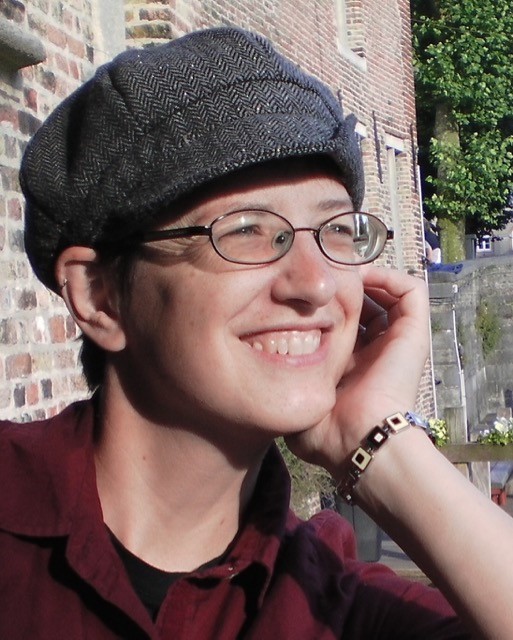 Dr. Jessica Boon, Associate Professor in Religious Studies, has won the 2019 Prize for Best Article of Feminist Scholarship on the Middle Ages from the Society for Feminist Medieval Scholarship. This prize is awarded every two years (in odd numbered years) and was “established in 2004 as a way for the Society for Feminist Medieval Scholarship to recognize outstanding scholarly contributions.” The prize includes a monetary award and will be officially presented at the International Congress on Medieval Studies at Western Michigan University in May.
Dr. Jessica Boon, Associate Professor in Religious Studies, has won the 2019 Prize for Best Article of Feminist Scholarship on the Middle Ages from the Society for Feminist Medieval Scholarship. This prize is awarded every two years (in odd numbered years) and was “established in 2004 as a way for the Society for Feminist Medieval Scholarship to recognize outstanding scholarly contributions.” The prize includes a monetary award and will be officially presented at the International Congress on Medieval Studies at Western Michigan University in May.
Professor Boon’s winning article, titled “At the Limits of (Trans)Gender: Jesus, Mary, and the Angels in the Visionary Sermons of Juana de la Cruz (1481–1534),” was published in the Journal of Medieval and Early Modern Studies in 2018 and explores the visionary sermons of Juana de la Cruz through the more precise analytical categories derived from contemporary approaches to gender. To read the article, click here.
Congratulations, Jes!
Posted in Faculty News, Faculty Publications on February 19, 2019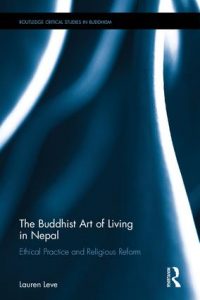 The Association for Nepal and Himalayan Studies (ANHS) has announced that Lauren Leve, Associate Professor of Religious Studies and Director of Graduate Studies, has won the first James Fisher Prize for First Books on the Himalayan Region for her book The Buddhist Art of Living in Nepal: Ethical Practice and Religious Reform (Routledge, 2016).
The Association for Nepal and Himalayan Studies (ANHS) has announced that Lauren Leve, Associate Professor of Religious Studies and Director of Graduate Studies, has won the first James Fisher Prize for First Books on the Himalayan Region for her book The Buddhist Art of Living in Nepal: Ethical Practice and Religious Reform (Routledge, 2016).
In honor of the scholarly contributions of Dr. James Fisher to scholarship in the region, the Fisher Prize honors books which contribute an innovative and lucid written account of Himalayan studies research. Professor Leve shares the prize with Sarah Shneiderman, Associate Professor of Anthropology at the University of British Columbia.
Professor Leve’s book chronicles how Theravada Buddhism has grown to have a significant presence in Nepal, especially among Newar communities of Kathmandu. The ANHS announcement includes the following statement: “Besides being a pleasure to read, the book’s significance lies in its ethnographic treatment of families adopting religious tenets which help them adjust to the contemporary changes of late modernity and neoliberal globalization.”
For the full prize announcement, see here.
Congratulations, Lauren!
Posted in Faculty News, Faculty Publications on April 4, 2018